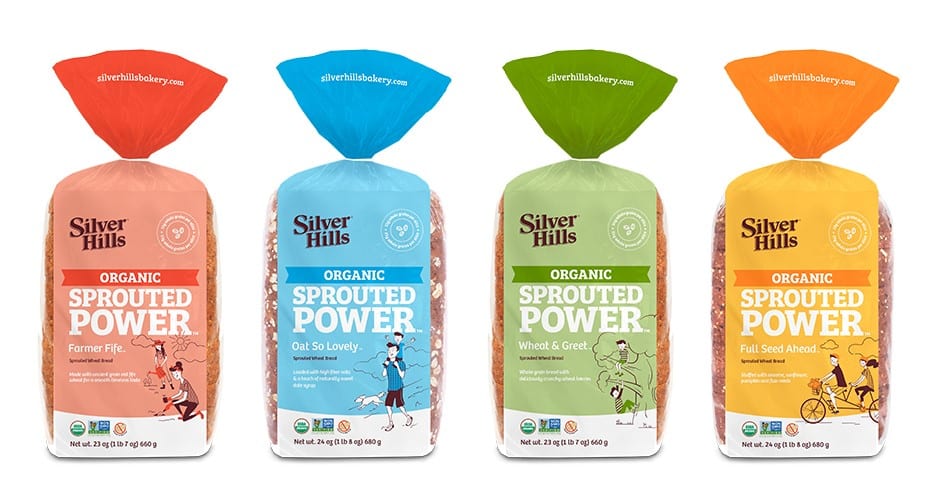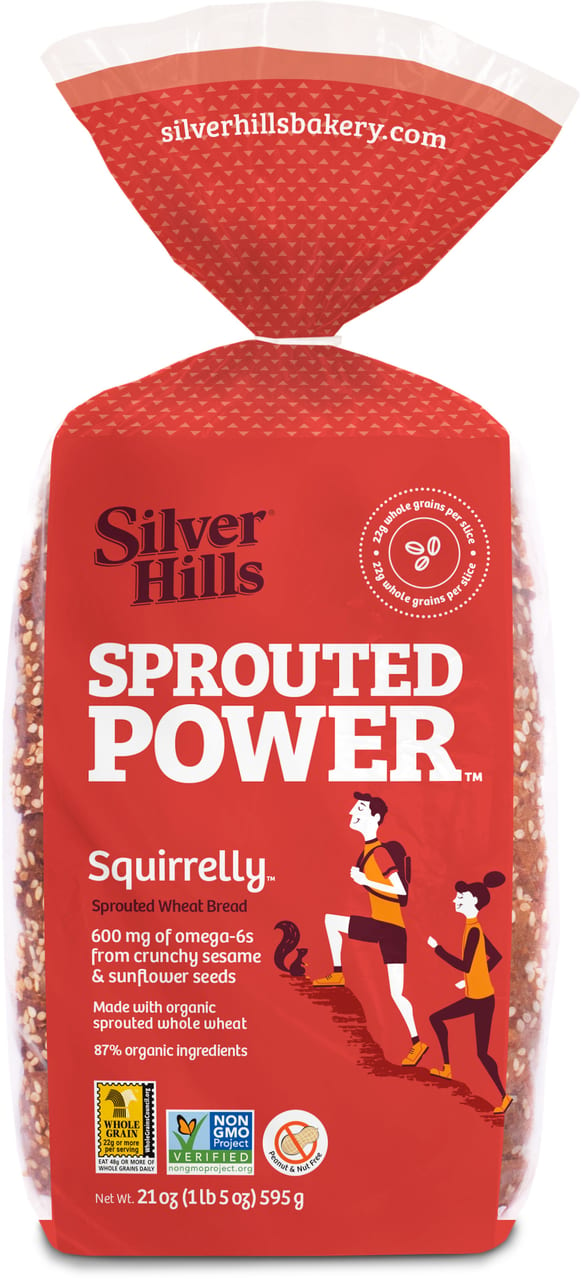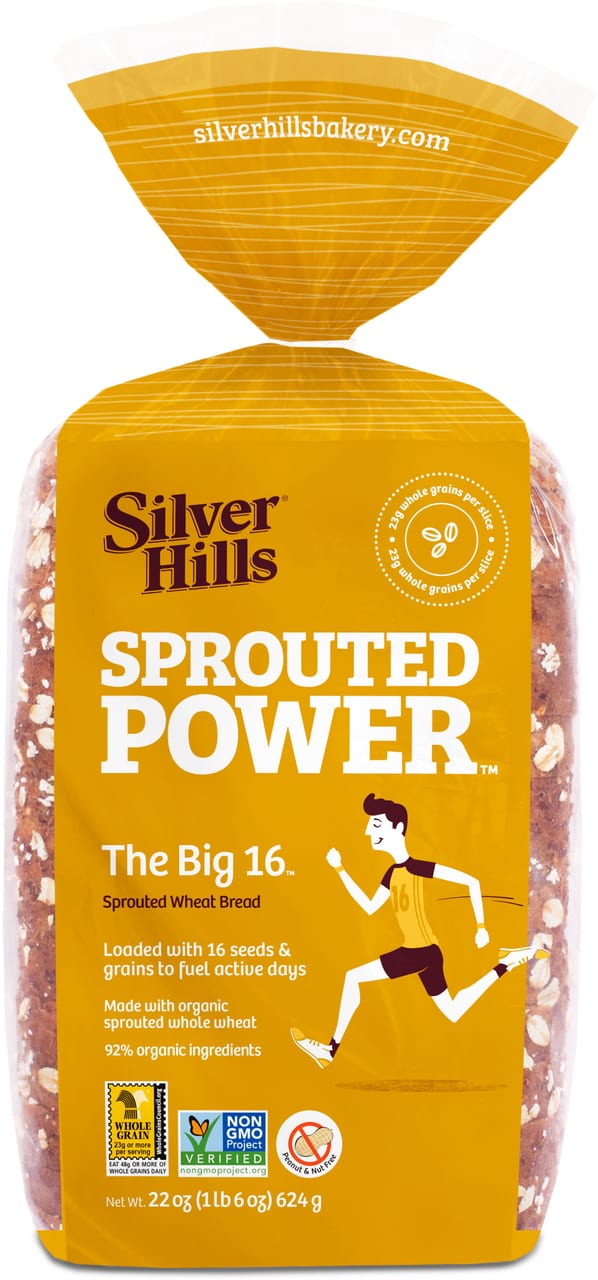
Sprouting from Canada
Silver Hills Bakery brings its better-for-you sprouted breads to the U.S.
Liz Parker, Managing Editor
In the 2nd century BC, a Jewish monastic group known as the Essenes created the first recipes and techniques for sprouted grain breads. Their style of bread is now called Essene, or “Manna bread.” Wheat grains were activated and left to sprout on a rock in the sun, which imitated the natural germination process. Afterward, the sprouted grain was crushed, shaped into thin wafers, and left atop a rock again. The bread was turned from side to side at midday when the sun was at its highest.
Nowadays, sun-soaked rocks are no longer required, and commercial bakeries—like Silver Hills Sprouted Bakery, based in Abbotsford, British Colombia—have continued the tradition of crafting sprouted breads. Silver Hills is no stranger to sprouted grains: It opened in 1989 with a mission to empower people by providing healthy choices. Its goal is to create a healthy world by making foods with care and purpose from sprouted grains and a list of simple ingredients.
AT A GLANCE
Company: Silver Hills Sprouted Bakery
Headquarters: Abbotsford, British Colombia
Website: https://silverhillsbakery.ca/
Annual revenue: Around $100 million
Number of employees: 300+
In-Store Bakery & Foodservice Products:
Sprouted breads, sprouted organic breads, sprouted buns, sprouted organic bagels, sprouted muffins, sprouted organic tortillas
Consumer Brands: Silver Hills Sprouted Bakery, Little Northern Bakehouse, One Degree Organics, Carbonaut
KEY PERSONNEL
Co-founder, Co-owner, President:
Stan Smith
Co-founder, Co-owner:
Kathy Smith
Co-founder, Co-owner, Vice President:
Brad Brousson
Chief Customer Officer:
Danny Houghton
Chief Marketing Officer:
Darren Mahaffy
Marketing Director:
Jodie Douglas
Marketing Coordinator:
Lauren Lyttle
Modest beginnings
Silver Hills Sprouted Bakery started almost 32 years ago, at a small healthy lifestyle retreat in North Okanagan, British Columbia, with some sprouted grains and water. The company’s intent was to help people in their quest for better health. Nowadays, Silver Hills is the third-largest bakery in Canada, with its products distributed throughout North America.
When Brad Brousson, co-owner, was growing up, his mother baked sprouted bread for a friend who was ill, citing that the sprouted grains in her family recipe had more health benefits than a regular slice of bread. Years passed, and after attending the healthy lifestyle retreat, he started baking his mother’s sprouted whole-grain bread for guests at the retreat. He soon partnered with friends Stan and Kathy Smith to begin Silver Hills Sprouted Bakery.
“Prior to starting Silver Hills, my wife Kathy and I were familiar with the bread-baking process, as I managed a sprouted grain bakery in the early 1980s. Within a few years, we partnered with our co-owner Brad Brousson and officially began our Silver Hills Sprouted Bakery journey in 1989. In the first year, we saw such increased demand, all thanks to word of mouth, and knew this would be something very special,” says Stan Smith, co-owner, Silver Hills.
As it turned out, Brousson’s mother’s belief was correct: There is a significant and growing body of scientific evidence showing that sprouted grains offer meaningful nutritional benefits.
Sprouting makes nutrients found in whole grains easier for bodies to break down. It does this by breaking down the antinutrients that protect the vitamins and minerals in every seed (antinutrients, which can interfere with the body’s absorption of nutrients, naturally occur in most foods). Sprouting makes vitamins and minerals more “bioavailable,” with higher antioxidant activity and increased vitamins C and E, as well as increased levels of folate, iron, and manganese. Sprouted whole grains are also easier to digest, thanks to increased dietary fiber and decreased levels of gluten and starch. In addition, sprouted whole grains serve up steady energy throughout the day because of their increased fiber, and provide a lower impact on the body’s glycemic response.
“Our aim is to ensure that the nutrient-dense power of sprouted foods is an accessible part of a healthy lifestyle, because when you invest in your own health, you will have more to share with others,” says Smith. All of Silver Hills Bakery’s products are plant-based and non-GMO, because the company believes in the power of plant-based nutrition and eating whole foods as close to their original state as possible, he notes.

Courtesy of Silver Hills Bakery
Expanding to the U.S.
In 1991, the Smiths and Brousson purchased a 160-acre farm in the village of Lumby, British Columbia, to grow spelt and other ingredients to make their bread. They began selling Silver Hills bread locally in small health food stores. When they were successful in that endeavor, some of the bigger grocery stores started calling—and it snowballed from there.
From the 1990s through early 2000s, all Silver Hills ingredients were grown at the Lumby farm, and its bread was baked there, as well. However, as demand continued, a new location was needed. In 2002, all operations moved to Abbotsford.
“More and more of our customer base was in Abbotsford, so from a logistics perspective, it made sense to move to the area, reducing the time in transporting product and delivering fresh bread to our customers faster,” says Smith. “Abbotsford is also close to Vancouver and close to the border, and it spurred our growth into the U.S.”
Similar to their Canadian counterparts, customers in the U.S. increasingly look for better-for-you products that contribute to a healthy lifestyle. So the Silver Hills brand continues to grow in all markets.
“Today, bread and baked goods is the fastest category for certified-organic products, and we’re continually innovating to meet this need,” says Darren Mahaffy, chief marketing officer.
Courtesy of Silver Hills Bakery


Uniquely sprouted
Silver Hills includes sprouted whole grains in every product SKU, and all products are also non-GMO, vegan, free of peanuts and tree nuts, soy-free, kosher, and certified glyphosate-free.
“We have a sprouted bakery product for every occasion and palate, and we’ve perfected our sprouting process for over 30 years,” says Smith. “Our grains sprout in carefully controlled conditions, with just the right amount of moisture and warmth to start the germination process. It’s also a priority that all of our ingredients are Non-GMO Project Verified and Certified Vegan to deliver nutrients at their most optimal level.”
The current lineup of Silver Hills products includes:
- Organic Sprouted Power loaf breads
- Sprouted Whole Grain Burger Buns (introduced in 2013)
- Sprouted Whole Grain Hot Dog Buns (introduced in 2013)
- Organic Sprouted Bagels (introduced in 2017)
- Organic Whole Grain Tortillas (Canada only, introduced in 2018)
- Sprouted Soft Wheat English Muffins (introduced in 2019)
Silver Hills Bakery also has a sister brand, One Degree Organic Foods, offering Ancient Whole Wheat Bread, Flax and Spelt Bread, Lentil Grain Bread, and Sesame Sunflower Bread, as well as Instant Oatmeal, Rolled Oats, Ancient Maize Flakes, and Cacao Crisps.
“At One Degree Organic Foods, we make it our business to maintain the highest integrity of clean, organic, non-GMO, and Glyphosate Residue Free foods,” says Danny Houghton, chief customer officer. “Although food manufacturers are not required to test for glyphosate residues, we already test for it voluntarily. All One Degree Organics products have undergone rigorous testing to be certified as Glyphosate Residue Free and display the BioChecked Non Glyphosate Certified seal. Behind this extra step is a belief that glyphosate does not belong in our foods or our environment.”
In addition, Silver Hills has two other sister brands: Little Northern Bakehouse, which focuses on gluten-free bread, and Carbonaut, which offers low-carb bread with only 2 grams net carbs and 80 calories per slice.
Silver Hills sprouts its own grains on-site at its Abbortsford bakery. The process has taken over 30 years to perfect, and consists of two main steps:
- All whole grains are cleaned, sifted, and sorted before rinsing again to make sure they are as clean as possible.
- The grains soak in clear, fresh water at just the right temperature and for just as many hours as they need to sprout. Although every grain is unique, making sprouting a very artisanal, hands-on process—when you see the sprout’s tail emerging from the kernel, you know the sprouting process is complete, and you can drain the excess water. Once the sprouted whole grains are ready, you are ready to make the bread.
Courtesy of Silver Hills Bakery




